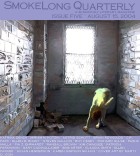You reach a certain point in your life, and you find yourself sitting in a hospital gown, crunched into the corner of the nuclear medicine ward, eating radioactive eggs.
“What do you zap the chickens with to get them to lay radioactive eggs?” I ask Don, who says he’s here to help me.
“It’s radioactive dye. Try not to get it on your lips,” Don says.
“No problem,” I say. And you, Don, try not to laugh when I make a joke. That’ll make me feel much better.
I’m done, and Don takes the plate away, points to a door across the hall. In the aisles old men and women sit in wheelchairs, radioactive IV dripping into their veins.
Everything drips, in fact, eyes, breasts, mouths. I don’t belong here.
I walk into the room, face a grey blipping machine, the back of a nurse fidgeting with buttons. She introduces herself, back still turned, tells me to lie down on the pad.
“Lie there?” I tell Sheralyn, who’s also there to help me. “I’m—well—I just can’t.”
She turns around, finally, closes one eye. Why does she close one eye? No idea. Looks at me as a pirate might. “Arr? Why not ye lie down yonder, matey? It only be for an hour.”
“I’ll freak out if I have to lie still that long.”
“Issues?” she says. “You got issues.”
Ah yes, my pirate mate. You see I need to know, the obsessive-compulsive kind of having to know, exactly why my stomach feels the way it does at the same time any medical test requiring being still induces immediate, terror-filled panic attacks. So you see my dilemma, here. What’s going to win out: the need to know or the need to run?
“Too bad you didn’t say something before,” she says. “They have pills to calm people like you.”
I shake my head. “I can’t take pills. You can never be sure what they might do.”
“Man, to be you,” she says. “What a joy that must be.”
“A thrill a minute. So, any way to cut the lie-down time?”
My pirate friend eyes me over, as if I were a map full of X’s. She paces, looks at the machine. I do too, notice the straps for the hands, the locking of the head in place. As if I’m being held at sword-point, the flat, cushioned pads of the machine a plank, that’s what it’s like inside me—and yet, to run, to never know about this stomach pain, the gnawing from inside, that constant feeling of something on the tip of my tongue, an unreachable itch.
“What are you good for?” she asks. It takes a second to process the question, figure out what she means.
“I don’t know. A minute or two. But no straps.”
“Deal,” she says. She even pats my shoulder. Compassion. I am sick, you know. But they have yet to invent the machine to find it.
I lie down. The machine whirrs, clicks, begins to press down upon my guts, and I squeeze my eyes full shut. I wonder what developed first, the fight, the flight, now they are connected somehow. Something to grasp onto—an image, a memory, a flight of fancy—a baseball game as a child, bases loaded; the fly fishing trip to Marble Canyon—like a virgin afraid of premature ejaculation—that’s what I’ve become.
The machine lifts up. “Only five more like that,” she says. “That wasn’t so bad.”
My God. I have a whole life to live after this.


 The core workshop of SmokeLong Fitness is all in writing, so you can take part from anywhere at anytime. We are excited about creating a supportive, consistent and structured environment for flash writers to work on their craft in a community. We are thrilled and proud to say that our workshop participants have won, placed, or been listed in every major flash competition. Community works.
The core workshop of SmokeLong Fitness is all in writing, so you can take part from anywhere at anytime. We are excited about creating a supportive, consistent and structured environment for flash writers to work on their craft in a community. We are thrilled and proud to say that our workshop participants have won, placed, or been listed in every major flash competition. Community works.